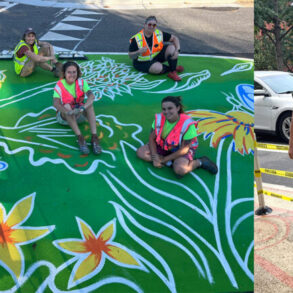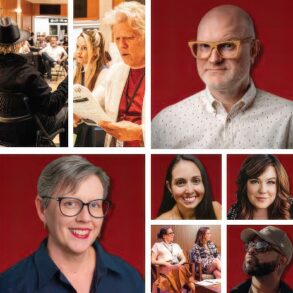
Goshen sculptor Sunday Mahaja says that when he was in school at Goshen College, he told his housemates he was majoring in art.
Their response was that they would be rich if he died because that is when an artist’s works become valuable. Mahaja decided he would prove them wrong. He graduated in 2014, and today he is still making art which can be seen in homes, businesses, churches, gardens, and on streets throughout the region.
Mahaja describes his sculptures as “breathing life into discarded metals.” He works with abandoned scraps that become graceful birds, whimsical animals, a ballerina, flowers, and even minions. He says he tries to include a little bit of humor, and often functionality, in what he creates.
For the artist, the work is a passion, and it is a business.
Forbes Magazine reports that in 2016, arts and cultural economics made up 4.3% of the U.S. gross domestic product. That’s a lot. It equates to $804 billion in that year; a larger share of the GDP nationwide than powerhouse sectors such as agriculture, transportation, and construction.
Too many artists fail to recognize the business side of art. Mahaja is unique in that he supplemented his art education at Goshen College with business classes and a class in public speaking. In addition, after earning a bachelor’s degree, he also earned a welding certificate at Ivy Tech, studied welding technology at Vincennes University, and worked on a factory line to improve the welding skills that he uses to create. Mahaja said that he wanted to leave school “fully loaded.”
By that he means he wanted to be able to create, manage a business, and talk about the art that he makes.
Today, Mahaja’s project is working on his entry for the biggest art competition in the world. The competition is called ArtPrize and Mahaja calls his entry “Rose Patch.” He describes it as a series of sculpted roses crafted from discarded metals. He says, “it is a reflection of the transformative power of art and nature amidst the remnants of industrial excess.”
The roses are fashioned from rusted gears, weathered wires and discarded machine parts. Whatever he calls it, the creation is beautiful.
Mahaja will join more than 1,600 artists from 53 countries and 42 states in competing at ArtPrize. The event is an international art competition in Grand Rapids, Michigan, that has taken place annually since 2009. Organizers call it a celebration of art and ideas.
This year, artists will compete in multiple categories for a share of $400,000 in prizes and $200,000 in grants. Mark your calendars. It takes place Sept. 13-28. It is open to the public; it is free; and the public gets to vote on who wins.
ArtPrize will show art at 200 different venues across Grand Rapids. The venues themselves choose the art they want to show. Multiple venues have already chosen Mahaja’s entry and asked him to show at their site. He has accepted an offer to show his “Rose Patch” at the Gerald R. Ford Presidential Museum.
Mahaja advocates that everyone should own art. He prices his work from $50 to $5,000, hoping that it can fit into just about any budget. He says that buying local art is important because it keeps local artists creating.
There is economic value in art. At ArtPrize, the grand prize is $125,000; the second-place winner takes home $50,000. The top prizes are awarded by public voting done by anyone who attends the event. If you attend you might consider voting for Sunday Mahaja, and demonstrate to the international art community that we have treasures right here.
That is another value of art: it creates a sense of community pride.
This post was originally published on this site be sure to check out more of their content







